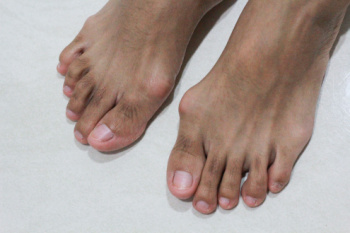Causes and Symptoms of Bunions

A bunion is a bony bump that forms on the joint at the base of the big toe, typically due to misalignment of some of the bones in the front of the foot. This misalignment can force the tip of the big toe toward the smaller toes, causing the base of the joint to protrude. Common causes of bunions include wearing tight or narrow footwear, hereditary foot shapes, and medical conditions like arthritis. Symptoms include swelling, redness, and persistent pain at the big toe joint. A podiatrist can assess the severity of the bunion and recommend appropriate treatment options. Non-surgical choices include wearing shoes with a wider toe box, using protective pads, or applying orthotic devices to redistribute pressure. If non-surgical measures are ineffective, surgery may be considered to realign the bones or remove inflamed tissue. If you have developed a bunion that is causing pain, it is suggested that you schedule an appointment with a podiatrist for an exam and treatment.
If you are suffering from bunions, contact one of our doctors of Advanced Foot & Ankle Medical Center. Our doctors can provide the care you need to keep you pain-free and on your feet.
What Is a Bunion?
A bunion is formed of swollen tissue or an enlargement of boney growth, usually located at the base joint of the toe that connects to the foot. The swelling occurs due to the bones in the big toe shifting inward, which impacts the other toes of the foot. This causes the area around the base of the big toe to become inflamed and painful.
Why Do Bunions Form?
Genetics – Susceptibility to bunions are often hereditary
Stress on the feet – Poorly fitted and uncomfortable footwear that places stress on feet, such as heels, can worsen existing bunions
How Are Bunions Diagnosed?
Doctors often perform two tests – blood tests and x-rays – when trying to diagnose bunions, especially in the early stages of development. Blood tests help determine if the foot pain is being caused by something else, such as arthritis, while x-rays provide a clear picture of your bone structure to your doctor.
How Are Bunions Treated?
- Refrain from wearing heels or similar shoes that cause discomfort
- Select wider shoes that can provide more comfort and reduce pain
- Anti-inflammatory and pain management drugs
- Orthotics or foot inserts
- Surgery
If you have any questions, please feel free to contact our offices located in Agoura Hills, Simi Valley, Thousand Oaks Marin St., and Thousand Oaks Haaland Drive, CA . We offer the newest diagnostic and treatment technologies for all your foot care needs.
